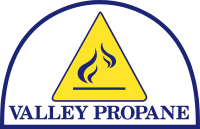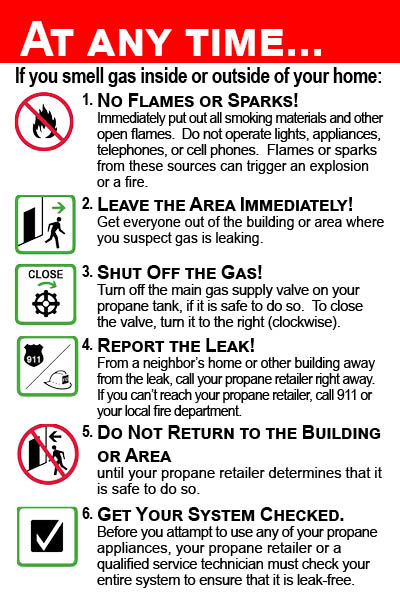Follow these before, during, and after instructions to keep your family safe in the event of a Winter Storm.
If a winter storm is predicted, listen to your local authorities, or television and radio stations, for instructions on the appropriate course of action to take. Although it is recommended to always have an adequate supply of propane in your tank, it is especially important during the winter months because in the event of a storm, roads leading to your home or farm might not be accessible for additional delivery. Snow and ice can create serious problems for your home’s propane system by freezing and cracking pipes, regulators, valves, or other types of propane equipment.
After a winter storm, use caution in the area surrounding your home or farm. If you have any doubts about your safety, leave the area immediately and have your property inspected by a qualified building inspector or structural engineer before re-entering. Take the time to carefully evaluate the condition of all the structures on your property. If it is dark, use flashlights, not candles. Look carefully around the entire area. Check for downed power lines; they can create major safety hazards. High winds or falling ice can move, shift, or damage gas lines and tanks. Immediately call your local utility company or propane retailer if any of these hazards exist. Follow These General Safety Rules
Sometimes, as a result of a winter storm, a power outage can occur, or pipes can crack and burst due to extremely cold weather. To help reduce the potential for injury or death, there are general safety rules you should observe at all times:
Be Prepared For Winter Storms Before They Happen
- Make sure your propane tank, whether it is located above or below the ground, is marked properly by a flag, pole, or stake
that is higher than the average snow cover depth for your location. This will increase the odds of it being seen by someone such as a snowplow operator, reducing the chances for a potentially fatal accident. - Have an adequate supply of propane in your tank. During and after a winter storm, roads leading to your home or farm might not be accessible for delivery. It is recommended that you establish a regular delivery schedule with your propane retailer.
- Know how and where to shut off the outdoor propane supply and indoor propane appliances. For more information, contact your propane retailer.
- MAKE SURE THAT YOU AND YOUR FAMILY KNOW WHAT PROPANE SMELLS LIKE. Propane has a strong, unpleasant smell like rotten eggs, a skunk’s spray, or a dead animal.
- NEVER store or place a propane cylinder indoors or in an enclosed area such as a basement, garage, shed, or tent.
- It is recommended that you consider installing a carbon monoxide (CO) detector listed by Underwriters Laboratories (UL) on every level of your home. Be sure to follow the manufacturer’s instructions regarding installation, location, and maintenance.
- Propane gas detectors provide an additional measure of security. It is recommended that you consider installing one or more propane gas detectors listed by UL. Be sure to follow the manufacturer’s instructions regarding installation, location, and maintenance.
- Have a list of instructions on how to turn off electricity, propane, and water. Review suggested preparations for weather hazards such as winter storms with your propane retailer as well as other utility suppliers. Advise them of any special needs you may have.
- Create an emergency preparedness plan and review it regularly with your family in order to keep them safe during a potential disaster.
If a winter storm is predicted, listen to your local authorities, or television and radio stations, for instructions on the appropriate course of action to take. Although it is recommended to always have an adequate supply of propane in your tank, it is especially important during the winter months because in the event of a storm, roads leading to your home or farm might not be accessible for additional delivery. Snow and ice can create serious problems for your home’s propane system by freezing and cracking pipes, regulators, valves, or other types of propane equipment.
- Make sure to clear snow and ice away from all outdoor vents, chimneys, and flues, thereby reducing the potential for CO
poisoning. Whenever possible, use a broom instead of a shovel in order to not damage your propane system components. - Clear snow and ice from around your propane tank. If the pipes freeze and crack, gas can pool in the snow, causing it to become an ignition source, creating a potentially dangerous situation.
After a winter storm, use caution in the area surrounding your home or farm. If you have any doubts about your safety, leave the area immediately and have your property inspected by a qualified building inspector or structural engineer before re-entering. Take the time to carefully evaluate the condition of all the structures on your property. If it is dark, use flashlights, not candles. Look carefully around the entire area. Check for downed power lines; they can create major safety hazards. High winds or falling ice can move, shift, or damage gas lines and tanks. Immediately call your local utility company or propane retailer if any of these hazards exist. Follow These General Safety Rules
Sometimes, as a result of a winter storm, a power outage can occur, or pipes can crack and burst due to extremely cold weather. To help reduce the potential for injury or death, there are general safety rules you should observe at all times:
- NEVER use outdoor propane appliances indoors or in enclosed areas. This can result in CO poisoning or death. These include
outdoor portable heaters, barbecue grills, and portable generators. Only use appliances indoors that are designed and approved for indoor use. - NEVER store or place a propane cylinder indoors or in an enclosed area such as a basement, garage, shed, or tent.
- NEVER use a gas oven or range-top burners to provide space heating.
- DO NOT UNDER ANY CIRCUMSTANCES TRY TO MODIFY OR REPAIR VALVES, REGULATORS, OR OTHER APPLIANCE PARTS.
- If melting snow or ice floods any part of your home or farm, NEVER turn on a light switch, use any power source, or inspect
your household appliances while standing in water. This can result in electrocution. - DO inspect chimneys, flue pipes, and vent connectors for damage, blockage, or debris.
- DO inspect your propane appliances for water or other damage, if it is safe to do so. If the appliances have electric components
and have been exposed to water, they can create a fire hazard.
If you suspect any of your propane appliances, equipment, or vehicles have been under water or they have been damaged, or you have turned off your gas supply:
- DO schedule a time for a qualified service technician to perform a complete inspection of your propane system. The technician can also perform a leak test on the system and re-light your pilot lights.
- DO NOT use or operate appliances, equipment, or vehicles, or turn on the gas supply, until your system has been inspected by a qualified service technician.

